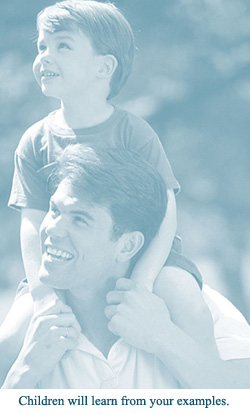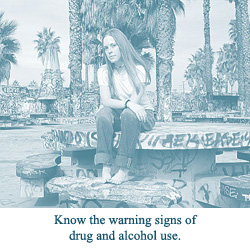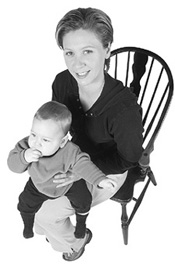Questions to Ask
Are you planning ways to commit suicide or to harm your child
as a way to get out of parenting?
|
 |
|

|
|
Do you have one or both of these concerns?
- Feel out of control and you are tempted to hit your
child
- You fear that your child will harm you
|
 |
|

|
|
Are you or your child doing any of the following to cope?
- Taking drugs
- Abusing alcohol
- Taking part in dangerous activities
|
 |
|

|
|
Are you experiencing overwhelming problems in coping as a
parent?
|
 |
|

|
|
Do you have frequent problems with your employer due to your
child care / disciplining responsibilities?
|
 |
|

|
|
Does your child frequently act out of control in school, at
home, and/or in social situations and are you not able to cope
with this?
|
 |
|

|
|
|

|
|
Self-Help
Effective parenting skills can be learned.
 |
Take courses in effective
parenting, such as Systematic Training for Effective
Parenting (STEP) and STEP of Teens. Check local community
education programs for places where these are offered. |
 |
Follow the principles
generally agreed upon by professionals to be important in
effective parenting:
- Unconditional love. This means that you love
your child without exception and you let your child know
this. Unconditional love is always present even when the
child has misbehaved. Let your child know when you do
not like their behavior, but that you love them.
- Constructive discipline. Set and stick to
specific standards of behavior. This is an important
part of readying your child to adjust to the world.
Discipline should take the form of “do’s” rather than
“don’ts.” Carry through with consequences when you say
you will. Don’t make idle threats. Discipline should be:
- Consistent – Don’t undermine your
spouse and don’t change what is or isn’t acceptable
behavior from one day to the next.
- Clear – Tell the child specific
rules to follow and the consequences of not
following these rules.
- Private – Do not publicly
humiliate your child.
- Reasonable – Give the child a
reason they can understand.
- Flexible – Take your child’s point
of view into account.
- Independence promoting – Allow
your child an expanding role in decision making.
- Authoritative – Make a decision
and stick to it.
|
 |
Make time for your children.
This includes playing, talking, listening, and teaching them
how to do things around the house in addition to family
activities. |
 |
Make time for your spouse (if
applicable) and yourself. It is an easier job to be an
effective parent when you and your partner have a solid,
loving relationship. Also, make time for yourself and do
something you enjoy. This will help you avoid being
overwhelmed. Children need to know that everyone in the
family is important and that they are not the center of the
household. |
 |
Teach right from wrong.
Parents need to teach basic values and manners so the
children will function well in society. Be honest and show
respect, moral values, and kindness in dealing with your
children. |
 |
Listen. Good communication
between parent and child is vital. It lets children feel
that their ideas and feelings are important. Even if you
don’t agree with them, don’t criticize their ideas. However,
reinforce the idea that even though the two of you may have
differing opinions on certain subjects, certain behaviors
will not be acceptable (i.e., taking drugs, drinking, etc.). |
 |
Guide your children. When they
have problems, offer them “suggestions” rather than “should
do’s” or “better not do’s.” This encourages them to find
their own solutions. |
 |
Be realistic. Expect to make
mistakes and allow your children to make mistakes. Be aware
that they have many outside influences to deal with, such as
peer pressure, which may conflict with your teachings. |
 |
Praise your children. Give
compliments to your children for doing something well. |
|

 |
Special Parenting Concerns
In today’s complicated world, life or death issues now face parents in
raising their children. These include:
 |
Drug/alcohol abuse |
 |
AIDS |
 |
Random violence |
Raising children is complex. It requires a range of skills and knowledge.
Today’s parents must have a firm handle on how to effectively deal with
their children regarding the concerns listed above. The following
suggestions can help parents understand these special parenting concerns.
 |
Educate yourself. Learn all
you can about the subjects in the previous column by reading
and talking to professionals who deal with these topics.
(See “Alcohol Problems” and “Drug
Dependence”.) |
 |
Know the warning signs of drug
and alcohol use
- Abrupt change in mood, attitude, or appearance
- Decline in performance and/or attendance at school
or work
- Resistance to disciple and/or “authority” figures
- Withdrawal from family and/or friends
- Recurrent fights
- Increased borrowing (or stealing) of money from
parents, siblings, employer
- Replacing old, stable friends with new, unstable
ones
|
 |
Educate your children. Make
them aware of the many dangers of drug/alcohol abuses and
unsafe sexual practices. Talk to them about AIDS and how to
prevent it through abstinence or safe sex. If it is not easy
for you to talk to your child about these issues, arrange
for other knowledgeable and caring persons to do so. |
 |
Communicate. Talk to your
children and let them know that they can count on you in a
crisis. |
|
 |
|










